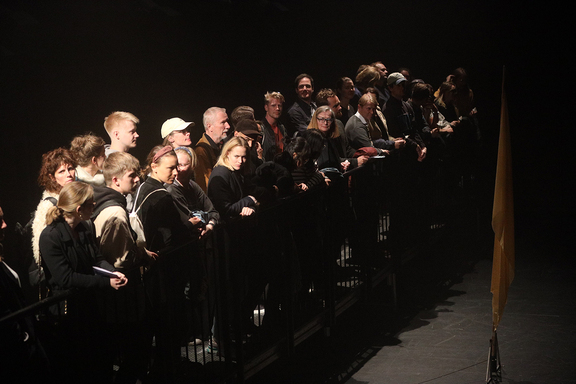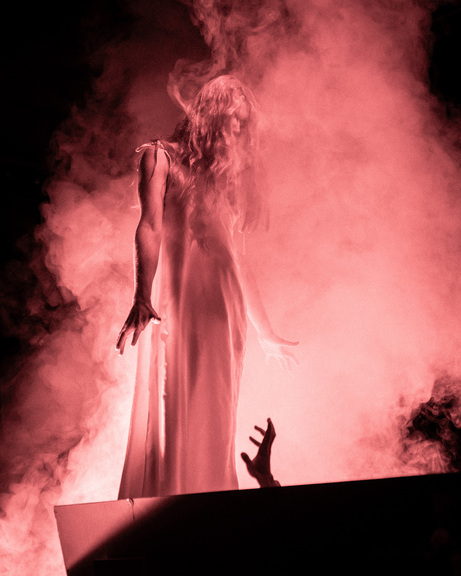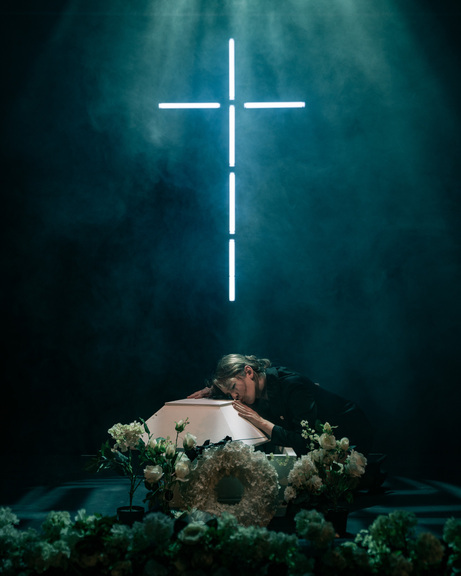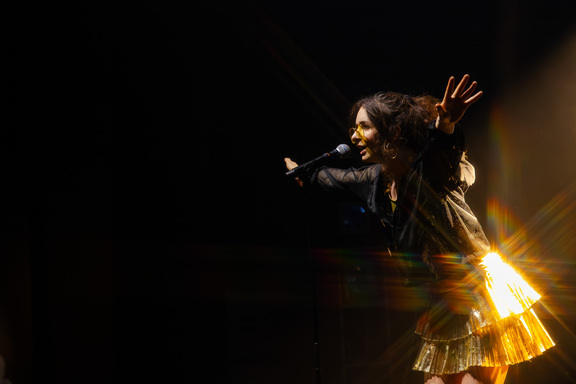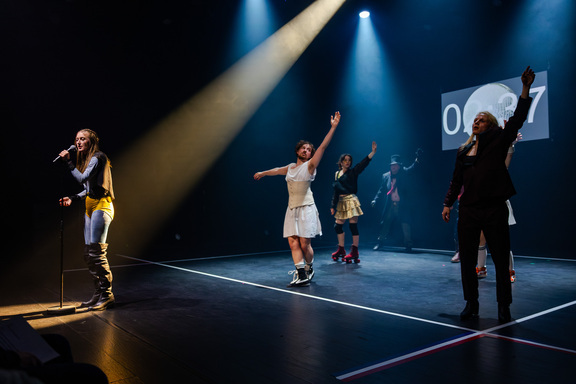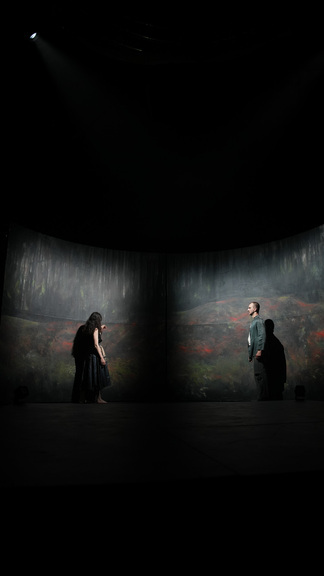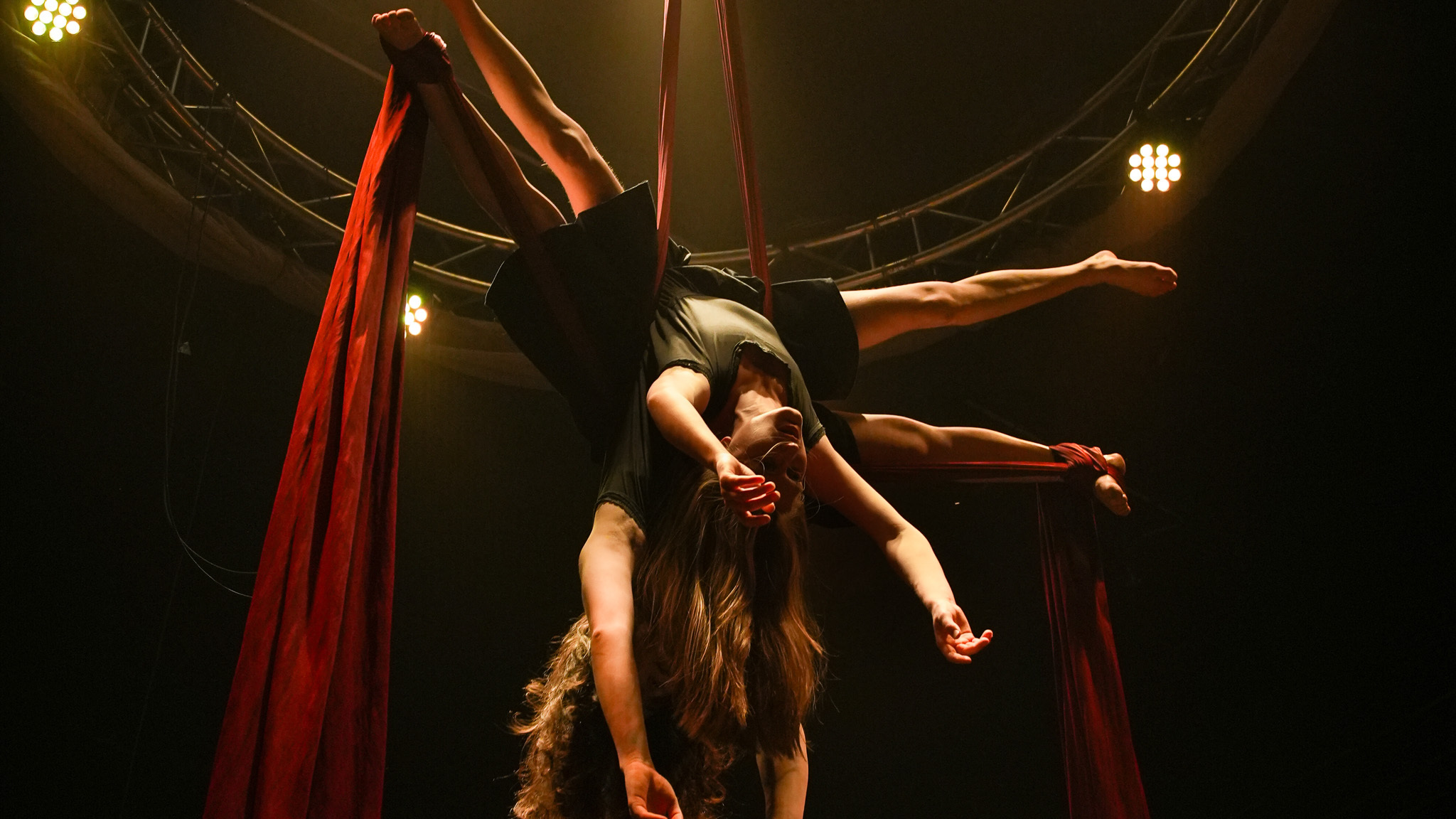

Master's programme in Theatre
The master’s programme in Theatre is a two-year full-time programme that offers specialization in the fields of acting, directing/opera directing, writing and dramaturgy. The programme is based on a bachelor's degree in Acting, Directing, Writing, Dramaturgy or Opera, or equivalent education and/or experience. It aims to offer you an in-depth, specialized education and to equip you with the knowledge and tools you need to succeed and make a meaningful contribution to the world of theatre.
Note: the description and curriculum on this page refer to admission for the study year 2024/25 onward. For current students that started the study programme Autumn 2023 or before, refer to the Norwegian page for a full curriculum.
By focusing on the interplay of collaboration and individual specialization, we hope to empower you to take responsibility for your own artistic development, and to foster a diverse and dynamic community of theatre artists who create impactful work that reflects the current cultural and societal contexts. In the first year, you will take common courses in addition to your specialization in both the first
and second semesters. The second year will focus on the evolvement of your craft through exchange and/or internship and will culminate with the development and realization of the master project.
Through a combination of colloquia, workshops, ensemble work, theatre practice, exchange/internships, and vocational training, you will gain a comprehensive understanding of your chosen specialization. The programme has a focus on learning through doing, both individually and as a team. It also incorporates reflection, feedback, and theory to help you apply skills and knowledge to a range of theatrical contexts. The programme encourages a cooperative approach, highlighting the collaborative nature of the creative process to facilitate effective teamwork.
The programme provides 120 ECTS credits. Completing the degree qualifies students to apply for admission to the artistic research programme and to relevant PhD programmes.
Programme description
This programme description is valid from the Autumn semester of 2024.
Brief programme description
The master’s programme in Theatre is a two-year full-time programme that offers specialization in the fields of acting, directing/opera directing, writing and dramaturgy. The programme is based on a bachelor's degree in Acting, Directing, Writing, Dramaturgy or Opera, or equivalent education and/or experience. It aims to offer you an in-depth, specialized education and to equip you with the knowledge and tools you need to succeed and make a meaningful contribution to the world of theatre.
By focusing on the interplay of collaboration and individual specialization, we hope to empower you to take responsibility for your own artistic development, and to foster a diverse and dynamic community of theatre artists who create impactful work that reflects the current cultural and societal contexts.
In the first year, you will take common courses in addition to your specialization in both the first and second semesters. The second year will focus on the evolvement of your craft through exchange and/or internship and will culminate with the development and realization of the master project.
Through a combination of colloquia, workshops, ensemble work, theatre practice, exchange/internships, and vocational training, you will gain a comprehensive understanding of your chosen specialization. The programme has a focus on learning through doing, both individually and as a team. It also incorporates reflection, feedback, and theory to help you apply skills and knowledge to a range of theatrical contexts.
The programme encourages a cooperative approach, highlighting the collaborative nature of the creative process to facilitate effective teamwork.
The programme provides 120 ECTS credits. Completing the degree qualifies students to apply for admission to the artistic research programme and to relevant PhD programmes.
Admission requirements
Admission takes place based on formal education and admission tests. The programme requires the completion of a Bachelor-level education (180 ECTS credits) in Acting, Directing, Writing, Dramaturgy or Opera, or equivalent education and/or experience. The Academy may approve other documented qualifications that are either completely or partially equivalent to the educations mentioned above. Applicants are ranked according to the results of the admission tests. Applicants must document proficiency in English.
Learning outcomes
After graduation, the student will be able to:
- Identify, appropriately select, utilize and research artistic methods within the field of their chosen specialization.
- Exhibit a high level of professional commitment and a cooperative attitude that is sensitive to the collaborative nature of the creative process.
- Demonstrate a critical and informed understanding of ensemble methods and be able to proactively contribute to the creation of high-quality results in an ensemble of multidisciplinary performing artists.
- Identify, utilize and research artistic methods of stage design and composition in their artistic practice.
- Effectively substantiate ideas and opinions about their artistic work, demonstrating a reflective approach to their own aesthetic principles, thoughts and beliefs.
- Produce and develop theatre/opera productions on a professional basis, including the ability to manage physical resources accurately, creatively and effectively to ensure high production values.
- Initiate and manage theatre/opera productions and complex artistic processes in a practical and ethically responsible manner.
- Demonstrate artistic integrity and critical reflection in relation to the artistic, philosophical, political and ethical frameworks of their own artistic practice and research.
Structure and progression
As a student in the Master’s programme in Theatre, you will be encouraged to actively learn and seek out opportunities to develop your abilities through participation, observation, analysis, and self-evaluation in a collective learning environment. The program is designed to help you achieve your goals and building the skills necessary to succeed in the theatre industry.
The Master’s programme in Theatre offers four specializations: acting, directing/opera directing, writing and dramaturgy, and a flexible approach to learning that allows you to pursue your own interests and goals. The curriculum is designed to be flexible, allowing for a wide range of interests and a more specialized approach. The program also includes artistic research projects conducted by staff and PhD fellows. Teachers and students work together to develop and evolve themes for courses that reflect your interests and establish a research-based focus in the study plan.
All students are required to study common subjects that include dramaturgy, ensemble work, stage design and composition, philosophical aesthetics, theatre and project management, evolvement, and master project. These subjects will explore theatre as a collective art form, with a strong emphasis on artistic collaboration and interdisciplinarity. They will be addressed through various formats such as workshops, lectures, seminars, projects, and performances.
Exchange
Students at the Oslo National Academy of the Arts will have the opportunity to evolve and expand their professional network by participating in international exchange programs and/or internships in the professional field of theatre. In practical training and elective courses, students will learn to work in the professional field of the theatre or alternatively gain perspective from other artistic/academic institutions. Through these exchange opportunities, students can achieve the same while also gaining experience from an international environment.
These exchange agreements are valid for master's programme in theatre:
Teaching and learning methods
The Master courses will utilize a variety of learning formats to provide you with a well-rounded education that combines theoretical knowledge with practical skills. Use of studios and stages will also provide you with a real-world learning environment that mirrors the professional field of the theatre. The unique facilities at the Academy of Theatre provide excellent working conditions and professional standard stage experience.
By incorporating workshops, projects, and etudes, you will have the chance to gain experience working in a collaborative environment and applying the essential methods and research questions required for success in the professional field of the theatre.
The programme has special teaching arrangements for English-speaking students so that all courses and options can be completed without being proficient in Norwegian.
Assessment
Assessment will take the form of an artistic portfolio where you will document and reflect upon your research questions, artistic process and results during the entire programme.
The portfolio will be reviewed at the end of each term in Master forum, where you will receive training in communicating about your own and fellow students work, and other relevant artistic issues. The Master Forum summarises the learning objectives, practice and execution.
The assessment of The Master project will be an oral evaluation where you will discuss your work and present your portfolio.
Quality assurance
The Oslo National Academy of the Arts has in place systems to ensure and further develop the quality of all aspects of education. The students are important contributors to this work by, among other things, participating in evaluations of their courses and other student surveys.
Course structure
| Course code | Course name | ECTS Credits |
|---|---|---|
| TE5101 | Dramaturgy and Artistic Research | 10 |
| TE5102 | Ensemble work and Collective Strategies | 10 |
| TE5103 | Stage Design and Composition | 10 |
| TE5104 | Aesthetics and Performing Arts | 5 |
| TE5105 | Theatre- and Project Management | 5 |
| TE5114 | Specialization 1 - Dramaturgy | 10 |
| TE5124 | Specialization 2 - Dramaturgy | 10 |
| TE5113 | Specialization 1 - Directing/Opera Directing | 10 |
| TE5123 | Specialization 2 - Directing/Opera Directing | 10 |
| TE5112 | Specialization 1 - Acting | 10 |
| TE5122 | Specialization 2 - Acting | 10 |
| TE5111 | Specialization 1 - Writing | 10 |
| TE5121 | Specialization 2 - Writing | 10 |
| Course code | Course name | ECTS Credits |
|---|---|---|
| TE5201 | Evolvement/Free moving (Master forum 2) | 30 |
| TE5250 | Master project | 30 |
Admissions
The application deadline is February 01, 2026 23:59
About the Academy of Theatre
Since its founding in 1953, the Academy of Theatre has been Norway’s leading educational institution for the acting professions. The Academy offers a three-year Bachelor’s course for actors and directors and a two-year Master’s course in theatre, specialising in acting, direction, stage writing and stage design. The department also offers a practice-oriented teacher training course (PPU) for drama teachers.
The Academy embraces both traditional and experimental techniques. Our primary goal is to help our students develop all the skills they need for a career in theatre, uniting the traditional craft that has long underpinned our great theatrical institutions with the best of the more experimental and creative techniques coming from the independent field.
The Academy offers not only a valuable vocational education, but also a first-class arts education. We aim to encourage and develop our students’ artistic abilities, giving the theatrical world not only the supply of new talent it craves, but perhaps also some fresh perspectives it doesn’t yet know that it needs.
